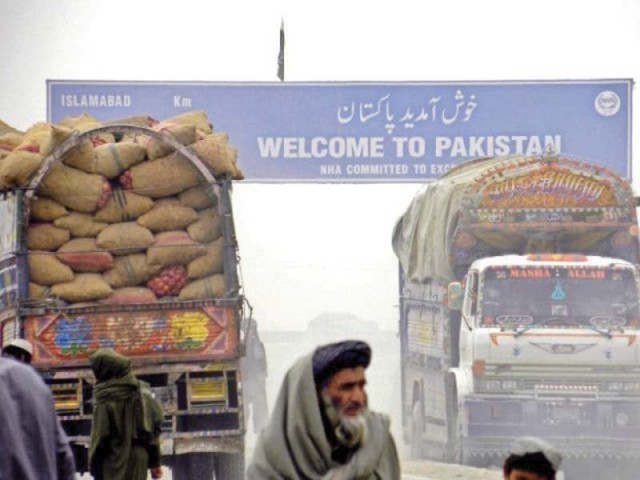Fading leverage: Transitioning off as a transit hub
Pakistan’s inability to take geographical advantage

At present, the major portion of the transit goods is being transported through the roads network. PHOTO: FILE
The landlocked territory of Afghanistan has been using the ports of Pakistan for its access to global trade since ancient times. Till 1965, the traffic in transit was regulated through various fragmented regulations of the federal, provincial and local authorities. In 1965, these regulations were consolidated into a bilateral transit treaty that guaranteed Afghanistan’s access to the seaports of Pakistan.
The stakeholders in Pakistan and Afghanistan wanted to upgrade the existing regulatory framework to cater for increasing trade volumes and connectivity. In addition, these stakeholders, both public and private, also wanted to address the issue of smuggling that was not only undermining the revenue efforts of the federal government but also causing injury to the domestic industry.
In this backdrop, the 1965 transit treaty was replaced by Afghanistan Pakistan Transit Trade Agreement (APTTA) that entered into force on June 12, 2011. The international community including United States and the European Union welcomed the new treaty with the hope that it would foster economic growth and regional integration.
After the implementation of the new transit treaty, volumes of transit goods from the ports of Pakistan have reduced substantially. In 2011, 90,000 Afghan trade containers transited through the territory of Pakistan. In 2014, this volume was reduced to 40,000 containers. The major portion of Afghan transit trade has been shifted to the ports of Iran. One of the major reasons for this is the increase in transaction cost for Afghan traders due to the implementation of the new transit treaty.
The Chabahar port in south-eastern Iran is emerging as an attractive and viable option for Afghanistan traders for international trade. The Chabahar port is 72 kilometres west of Gwadar and provides Iran direct access to the Indian Ocean.
The Iranian government has invested substantial resources to upgrade this port with the strategic objective to create an alternative to Bandar Abbas, which is located further west across the state of Hormuz. Iran fears that any blockade of the Straits of Hormuz would create challenges for its trade and commerce activities.
India and China have also invested in the Chabahar port for its upgradation and connectivity with eastern Afghanistan and Central Asia through roads and railway links.
According to trade experts, one transit container brings economic benefits to the tune of $2,000 for the economy of the transiting state. Due to diversion of transit traffic from Pakistan, the economy of Pakistan has lost $100 million. The major losers have been ports of Pakistan, the services sector such as transporters and freight forwarders and the border regions of K-P and Balochistan, which are already suffering from economic deprivation due to insurgency and terrorism.
The persistent complaints by Afghan traders have been due to security measures taken by Pakistan to ensure that the transit goods are not diverted for domestic consumption. Under the treaty, Pakistan is using financial security for the release of the transit goods through bonded carriers in which tracking device have been installed to ensure that the non-duty paid transit goods follow the designated routes.
These measures have enhanced the transit costs by as much as 25%. Whether these measures have controlled the menace of smuggling is debatable amongst the policymakers and law enforcement officials in Pakistan. Recent survey conducted for Bara markets across Pakistan reveals that the markets are full of smuggled goods from basic raw materials to high-end luxury goods.
The other irritant for transit cargo is the lack of transshipment facilities. The cargo released from ports of Pakistan is denied transshipment and transloading facilities en route which was available in the previous treaty. The law enforcement agencies fear that the transshipment may lead to pilferage of the transit consignment.
The transshipment or distribution hubs are common practices in international logistics. Pakistan needs to reconsider this ban and encourage private sector to establish such facilities near the land border stations to facilitate traffic in transit.
The deterioration in the capacity of Pakistan Railways for freight transport has also undermined Pakistan competitiveness for transit trade. At present, the major portion of the transit goods is being transported through the roads network.
Pakistan provides the shortest and most direct route for the Afghan transit trade. The loss of competiveness and transit business to other regional ports do not augur well for the policy objectives of the current government to be the hub for trade and transit in the region.
THE WRITER IS A POLICY EXPERT WITH OVER 20 YEARS OF EXPERIENCE IN THE PUBLIC AND DEVELOPMENT SECTORS
Published in The Express Tribune, June 15th, 2015.
Like Business on Facebook, follow @TribuneBiz on Twitter to stay informed and join in the conversation.


















COMMENTS
Comments are moderated and generally will be posted if they are on-topic and not abusive.
For more information, please see our Comments FAQ